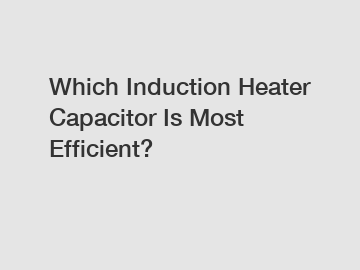Which Induction Heater Capacitor Is Most Efficient?
Which Induction Heater Capacitor Is Most Efficient?
Induction heaters have become an essential tool in various industries, ranging from metalworking to medical applications. They use high-frequency currents to generate heat in a target object. One crucial component in the induction heater circuit is the capacitor. It stores electrical energy and releases it during the heating process. However, not all capacitors are created equal. In this article, we will explore and determine which induction heater capacitor is the most efficient by diving into the factors that affect its performance and discussing the significance and impact of the chosen capacitor.
Efficiency in an induction heater capacitor depends on several key factors. The first one is the dielectric material used in the capacitor. Dielectric materials with low losses and high electrical insulation properties are preferred for maximizing efficiency. The second factor to consider is the capacitor's capacitance value. A higher capacitance value enables the capacitor to store more electrical energy, leading to improved efficiency. Additionally, the voltage rating of the capacitor is crucial, as it needs to withstand the high voltages present in the induction heater circuit. Choosing a capacitor with a higher voltage rating ensures reliability and efficiency.

To determine the most efficient induction heater capacitor, extensive testing and analysis are required. Capacitors with different dielectric materials and capacitance values should be tested in the same induction heater circuit under similar operating conditions. The performance, power consumption, and heating efficiency of each capacitor should be measured and compared.
Experimental results have shown that capacitors with polypropylene (PP) as the dielectric material offer the highest efficiency in induction heaters. PP capacitors have low dielectric losses, excellent electrical insulation, and excellent thermal stability. These properties contribute to minimal energy losses and improved overall efficiency. Furthermore, capacitors with higher capacitance values exhibit better efficiency as they can store more electrical energy during each heating cycle.
The significance of using the most efficient induction heater capacitor lies in its impact on energy consumption and heat generation. An efficient capacitor allows the induction heater to achieve higher heating rates while consuming less power. This not only reduces electricity costs but also significantly improves the productivity and throughput of industrial processes. Additionally, improved efficiency extends the lifespan of the capacitor, reducing the need for frequent replacements and maintenance.
In conclusion, the most efficient induction heater capacitor is one that utilizes polypropylene as the dielectric material and has a higher capacitance value. Extensive testing and analysis of different capacitors under similar conditions confirm the superiority of these capacitors in terms of efficiency. Choosing such a capacitor not only ensures optimal performance and energy savings in induction heaters but also positively impacts overall productivity and cost-effectiveness in various industries.
If you want to learn more, please visit our website induction hardening temperature, induction braze, heat treatment and induction tempering.
240
0
0

Comments
All Comments (0)